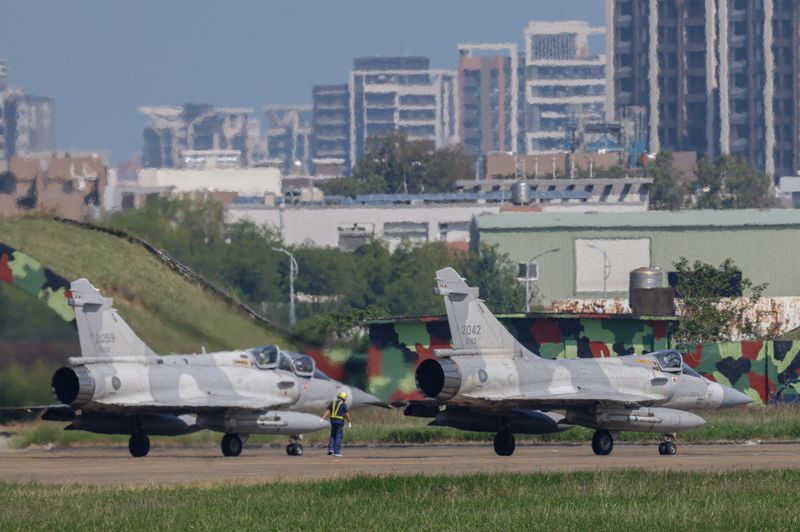By Ben Blanchard and Yimou Lee
TAIPEI (Reuters) – China’s military staged a day of war games near Taiwan on Monday, saying it was a warning to the “separatist acts of Taiwan independence forces” and drawing condemnation from the Taipei and U.S. governments.
China’s defence ministry vowed to take further action against Taiwan if needed, “until the Taiwan issue is completely resolved”, saying the drills were an increase in pressure against Taiwan independence.
Democratically governed Taiwan had been bracing for more war games since last week’s national day speech by President Lai Ching-te, but some analysts said Monday’s actions seemed calibrated to avoid inflaming the U.S. presidential race.
Lai’s address was condemned by Beijing after he said China had no right to represent Taiwan even as he offered to cooperate with Beijing, which views Taiwan as China’s own territory.
The Chinese military’s Eastern Theatre Command said the “Joint Sword-2024B” drills took place in the Taiwan Strait and areas to the north, south and east of Taiwan.
“The drill also serves as a stern warning to the separatist acts of Taiwan independence forces. It is a legitimate and necessary operation for safeguarding state sovereignty and national unity,” it said in a statement.
The command announced the end of the drills on Monday evening, and no further large-scale drills have yet been announced.
Earlier it issued a map highlighting nine areas around Taiwan where the drills took place – two on the island’s east coast, three on the west coast, one to the north and three around Taiwan-controlled islands next to the Chinese coast.
Chinese warship formations, destroyers and aircraft were approaching Taiwan in “close proximity from different directions”, focusing on sea-air combat-readiness patrols, blockading key ports and areas, and assaulting maritime and ground targets, the command added.
China’s Liaoning aircraft carrier and supporting ships were also involved east of Taiwan, the military announced – a deployment monitored by Taiwan’s military.
However, it did not announce any live-fire exercises or any no fly areas and a Taiwan security source said there were no signs of a missile launch.
Chinese state media said the rocket force carried out simulated missile launches while fighter jets “opened up air assault corridors” and bombers carried out long range missions.
The Taiwanese Defence Ministry said the drills involved 17 Chinese warships and 125 Chinese military aircraft – the most it had detected operating around Taiwan on a given day.
Nevertheless, Monday’s drills appeared less intense than action in 2022 when China fired missiles over the island shortly after then-U.S. House Speaker Nancy Pelosi visited Taiwan.
Singapore-based security analyst Collin Koh said it seemed the extensive coastguard actions surrounding Taiwan appeared to be a new front in China’s on-going ‘grey zone’ operations against Taipei, even if the broader drills were apparently limited to avoid unduly inflaming the U.S. election campaign.
“Besides the election, I suspect the current economic situation doesn’t warrant a further aggravation that stems from heightened cross-strait uncertainty,” said Koh, of Singapore’s S. Rajaratnam School of International Studies.
COAST GUARD INCURSIONS
China held the “Joint Sword-2024A” drills for two days around Taiwan in May shortly after Lai took office, saying they were “punishment” for separatist content in his inauguration speech.
A senior Taiwan security official, speaking to Reuters on condition of anonymity given the sensitivity of the situation, said they believed China was practicing blockading Taiwanese ports and international shipping lanes as well as repelling the arrival of foreign forces.
In a significant move on Monday, China’s coast guard vessels circled Taiwan and staged patrols close to Taiwan’s offshore islands of Matsu and Dongyin, entering the “restricted waters” of Matsu island for the first time to “tear up” boundaries set by Taiwan authorities, according to state broadcaster CCTV.
CCTV added that China “may carry out regular law enforcement patrols around Matsu in future.”
President Lai condemned the exercises and said they are “intended to undermine regional peace and stability and continue to coerce neighbouring countries by force.” Officials said Lai’s National Security Council met to discuss the situation.
In a propaganda video, the Eastern Theatre Command showed a cartoon caricature of Lai with pointed ears like a devil and fighter jets and warships around the island.
Security analysts are watching Chinese operations closely given its broader build-up of missile capabilities and efforts by the United States and its allies to improve defences against them.
‘BLATANT PROVOCATIONS’
Taiwan’s China policy-making Mainland Affairs Council said China’s latest war games were “blatant provocations” that seriously undermined regional peace and stability.
Taiwan’s presidential office said in a statement that China should face up to the fact of the existence of the Republic of China – Taiwan’s formal name – and respect the people of Taiwan’s choice of a free and democratic way of life.
In Washington, officials from the administration of U.S. President Joe Biden said they were monitoring the drills and there was no justification for them after Lai’s “routine” speech.
“We call on the PRC to act with restraint and to avoid any further actions that may undermine peace and stability across the Taiwan Strait and in the broader region,” State Department spokesperson Matthew Miller said, using the initials for the People’s Republic of China, China’s official name.
In a statement, the European Union warned that China’s drills “around the entirety of Taiwan” would stoke tensions.
“The EU reaffirms that peace and stability in the Taiwan Strait are of strategic importance for regional and global security and prosperity,” an EU spokesperson said.
Another senior Taiwan security official told Reuters that so far the drills were not particularly alarming in scale but Beijing was conducting “hybrid warfare” that included propaganda campaigns, economic coercion, sanctions on certain Taiwanese individuals and fake news operations.

On Monday, Beijing sanctioned a prominent Taiwan tech tycoon Robert Tsao and a lawmaker for separatist activities.
Taiwan’s stock exchange largely brushed off the tensions, with the benchmark index rising 0.3%, and there was no sign of public alarm.